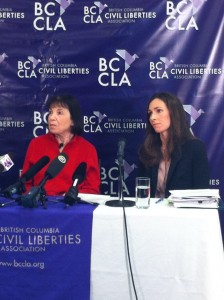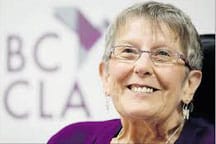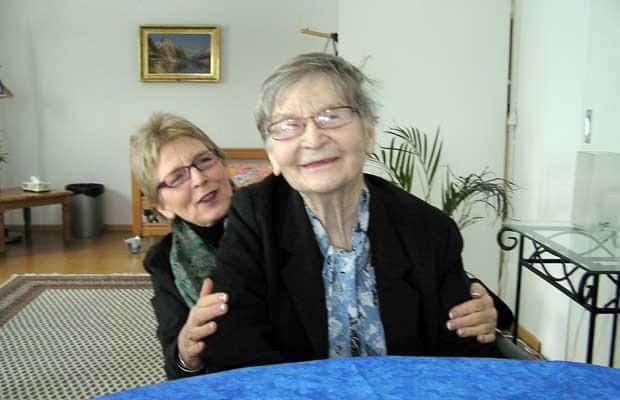 Synopsis
Synopsis
The BCCLA filed a lawsuit in April 2011 to seek to allow seriously and incurably ill, mentally competent adults the right to receive medical assistance to hasten death under certain specific safeguards.
The lawsuit claims that Criminal Code provisions against physician assisted-dying are unconstitutional because they deny individuals the right to have control over choices that are fundamental to their physical, emotional and psychological dignity and restrict the liberty of physicians to deliver end of life care to incurably ill patients.
The BCCLA believes that every Canadian should have the choice to have what they consider to be a good death, including the option of a medically-assisted death for seriously and incurably ill, mentally competent adults. Without a change in the law, seriously ill individuals will continue to suffer against their wishes at the end of life, without the choice and dignity that they deserve.
Progress in the Courts
- June 15, 2012: The BC Supreme Court released its judgment in the case. The BC Supreme Court ruled that the Criminal Code of Canada provisions against assisted dying violate the rights of the gravely ill and gave Parliament one year to rewrite the laws. The Court also granted plaintiff Gloria Taylor a constitutional exemption to seek a physician-assisted death.
- July 13th,2012: The federal government announced that it would appeal the BC Supreme Court ruling.
- March 18 – 22, 2013: The BC Court of Appeal heard the appeal of the case.
- October 10, 2013: The BC Court of Appeal released its decision, with a divided two-to-one decision overturning the historic BC Supreme Court ruling. The Court upheld the Criminal Code of Canada’s ban on assisted dying, citing the Supreme Court of Canada’s Rodriguez decision as a binding.
- October 25, 2013: The BCCLA filed for leave to appeal to the Supreme Court of Canada. The BCCLA has also asked the Court to fast-track its decision to hear the case and to speed up the timeline for hearing the appeal if the Court grants leave.
- November 1, 2013: The Supreme Court of Canada dismissed the motion to fast-track its decision to hear the case. The Court deferred the question of whether to speed up the timeline for hearing the appeal, if leave is granted, to the panel deciding the the application for leave to appeal.
- January 16, 2014: The Supreme Court of Canada announces it will hear the Carter v. Canada case later this year.
- October 14, 2014: The Supreme Court of Canada is scheduled to hear oral arguments in the case.
Additional Resources
- Case Documents
- Physician Assisted Dying FAQs
- Press Releases
- In Memory of Gloria Taylor
- Canada’s Top Lawyers Fight Tirelessly for Compassion at the End of Life
The People Behind the Case
Lee Carter and her husband Hollis Johnson are two of the individuals who are joined by the BCCLA in the lawsuit. Lee and Hollis accompanied Lee’s 89-year-old mother, Kathleen (“Kay”) Carter to Switzerland in January 2010 to end her life. Kay suffered from spinal stenosis, a degenerative condition, which confined her to a wheelchair, unable to feed herself, and suffering from chronic pain. Her doctor told her that the condition would quickly leave her reduced to lying flat in bed, completely unable to move. Kay feared she would become trapped in her own body and stripped of her independence.
“I believe that the choice to die with dignity should be available to all Canadians,” says Lee Carter. “My mother, Kay, was a lifelong supporter of the dying with dignity movement. She lived her life with passion, independence and resolve, and her independence extended to insisting that she would have choice and control over how she would leave this world. My mother was a great lady, and I feel like I am honouring her memory by participating in this legal challenge.”
Elayne Shapray, one of nine people to join the BCCLA’s case in 2011, is the latest brave Canadian to step forward as the face of Canada’s fight for choice and dignity at the end of life. Elayne, a woman who suffers from multiple sclerosis (MS) who has been seeking the right to die with dignity since this case began, filed an affidavit in support of the BCCLA’s application to the Supreme Court.

On June 29, 2011, Gloria Taylor filed an application with the BC Supreme Court asking to be added as a plaintiff in the BCCLA’s death with dignity lawsuit. Gloria, 63, of Westbank, BC, was terminally ill with ALS, a fatal neurodegenerative disease with no known cure or effective treatment.
Gloria began to experience the early symptoms of ALS in 2003. A neurologist diagnosed her with the disease in 2009. Eighty percent of people with ALS die within two to five years of diagnosis. On October 4th, 2012 Gloria Taylor passed away.


 “I believe that the choice to die with dignity should be available to all Canadians,” says Lee Carter. “My mother, Kay, was a lifelong supporter of the dying with dignity movement. She lived her life with passion, independence and resolve, and her independence extended to insisting that she would have choice and control over how she would leave this world. My mother was a great lady, and I feel like I am honouring her memory by participating in this legal challenge.”
“I believe that the choice to die with dignity should be available to all Canadians,” says Lee Carter. “My mother, Kay, was a lifelong supporter of the dying with dignity movement. She lived her life with passion, independence and resolve, and her independence extended to insisting that she would have choice and control over how she would leave this world. My mother was a great lady, and I feel like I am honouring her memory by participating in this legal challenge.”